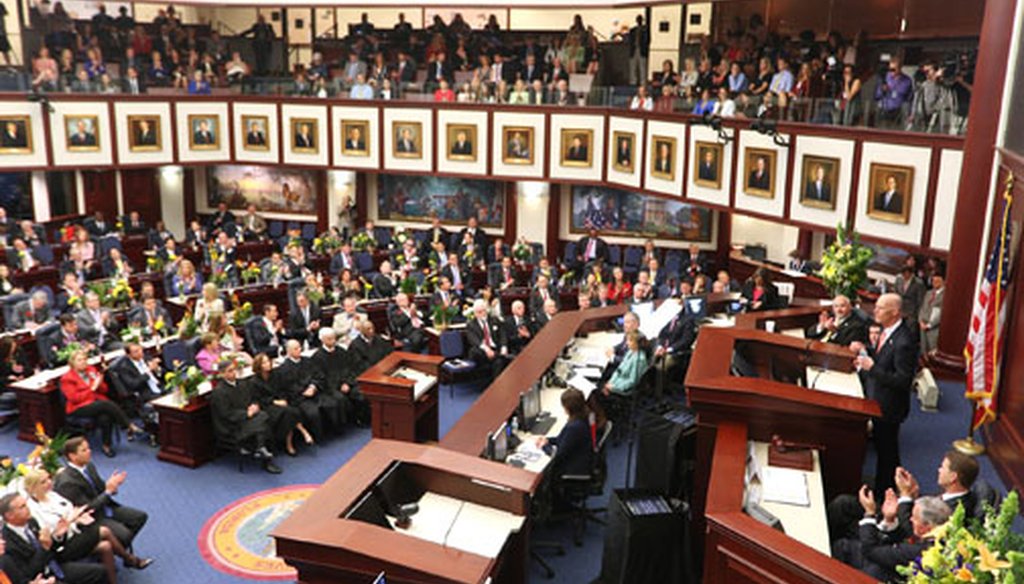Stand up for the facts!
Our only agenda is to publish the truth so you can be an informed participant in democracy.
We need your help.
I would like to contribute

Gov. Rick Scott addresses the Florida Legislature on March 3, 2015, for his State of the State address at the beginning of the session. (Tampa Bay Times photo)
With the Legislature starting a special session June 1 to settle on a budget, the elephant in the room is still the debate over what to do about Medicaid expansion.
Gov. Rick Scott and the House refuse to budge on the issue, arguing that expanding the federal health coverage program for the poor is bad for the state. The Senate has proposed -- and since modified -- a private solution that aims to use federal money guaranteed through the Affordable Care Act.
The sides were so intractable on the $4 billion difference between their proposed budgets, the House adjourned three days early in April, a move the Florida Supreme Court ruled unconstitutional. Scott has issued dire warnings of a "government shutdown" and ordered state agencies to draw up lists of critical services that must continue if the Florida Legislature cannot pass a budget by July 1.
Tied up into the debate is a joint state and federal program called the Low Income Pool, a discretionary program started in 2005 that helps pay hospitals for uncompensated care expenses from low income patients that are uninsured or underinsured (including Medicaid patients).
Despite telling Florida in April 2014 that the $2.2 billion LIP program was going to lose about $1.3 billion in matching funds, Scott included the program’s federal money in his proposed budget. When Washington stuck to its timeline of ending the program’s federal match, budget talks were thrown into chaos.
Sign up for PolitiFact texts
Washington has since backed off its yearlong warning telegraphing LIP’s demise, suggesting instead the program could be gradually phased out. But questions that still remain about what to do with the budget, even with federal money coming back.
There have been plenty of arguments about both the LIP and Medicaid expansion, with PolitiFact Florida working hard to cover all the bases.
Rick Scott vs. Washington
In April, the federal government told Florida that Medicaid expansion could be an alternative to the LIP. Scott and Republicans said this was counter to a 2012 U.S. Supreme Court ruling that kept Washington from withholding Medicaid money in states that didn’t expand the program, which the feds later denied. Scott sued the Obama administration for allegedly coercing the state into expanding Medicaid.
Scott has often characterized the issue as the U.S. government’s fault. "The same federal government that offers some money for a program is walking away from another health care program," he said in an April 6 speech.
The federal government did say it would stop paying for the program, so Scott has a point about losing LIP money. But Washington gave plenty of notice it was going to let the experimental LIP program expire, giving Florida ample notice to address the issue. Several health policy experts also raised the point that federal LIP funding is discretionary, while Medicaid money is guaranteed by law, which is unlikely to change anytime soon. We rated Scott’s statement Half True.
After meeting with the U.S. Department of Health and Human Services on May 6 to ask for LIP dollars to continue, Scott told reporters the program should not be tied to a potential Medicaid expansion in any way. "The families that are covered through the Low Income Pool is a different group of individuals than are covered by Obamacare," he said.
This makes it sound as if the people who would qualify for Medicaid under an expansion are completely different than patients who leave hospitals with unpaid bills the LIP fund helps pay to providers. Health policy experts said that while there would still be uninsured people not paying their bills under an expansion, plenty of overlap exists between the two, especially at lower incomes. We rated Scott’s statement Mostly False.
Medicaid concerns
But even if LIP wasn’t tied up in the expansion, there has been plenty of concerns about the Medicaid program on its own.
The Florida Chamber of Commerce raised its eyebrow in March after a state Senate panel approved a plan to accept $50 billion in federal dollars to expand coverage to about 800,000 low-income residents. The Chamber suggested a spending cap on Medicaid, saying the program is already close to 30 percent of the state budget and "the biggest expenditure at the state."
The 30 percent figure is correct if we count both the state and federal dollars that go toward Medicaid, and it is the biggest expenditure. However, if we only count state dollars, which are close to half that, then education eats up a bigger piece of the budget. It's important to understand that the federal government contributes to Medicaid, so we rated this claim Mostly True.
Future House speaker Richard Corcoran, R-Land O’ Lakes, attacked the program itself, implying Medicaid not only didn’t help patients, it was downright harmful to them.
"Medicaid patients were 97 percent more likely to die than those with private insurance," he said in April.
Corcoran was citing a 2010 University of Virginia study that looked at Medicaid patients who underwent surgery, not all people in the program. Experts we spoke to -- including one of the study’s authors -- said it’s a misleading statistic to cite. While it’s accurate to say Medicaid patients who undergo operations have higher odds of dying than those with private insurance, it’s because they are sicker and tend to wait until the last minute for care, not because the program is inadequate. Other studies show using Medicaid improves access and quality of life for many patients, or at the very least doesn’t hurt them.
We rated Corcoran’s statement Mostly False.
More House opposition
The arguments against expansion continued to be major talking points in the House. Speaker Steve Crisafulli, R-Merritt Island, said in April his constituents weren’t very concerned with extending Medicaid to more Floridians.
"Medicaid expansion isn’t necessarily a very popular issue on the street," he said.
He was speaking broadly about how constituents don’t want the expansion. Several polls give the edge to a majority of Floridians favoring the expansion, although results vary depending on how the questions are worded. A recent conservative poll found that Republicans don’t like the expansion by a wide margin.
Taken together, those numbers present a more nuanced picture than what Crisafulli suggested. We rated his statement Half True.
Later that month, Crisafulli said expanding Medicaid under Obamacare would be harmful to people who were enjoying private insurance bought with subsidies provided by the same Affordable Care Act.
"If we choose Obamacare expansion, 600,000 will lose eligibility for their subsidies, of which 257,000 would be forced into Medicaid," Crisafulli said.
Crisafulli was describing state projections that estimated about 609,000 Floridians would lose access to subsidies to buy insurance under an expansion. About 257,000 of those people would be uninsured, likely because they’re too poor to buy their own. The rest could enroll in Medicaid if they wanted to. But experts told us saying those people would be forced into the program isn’t accurate. Many of the very poor would likely see becoming eligible for Medicaid as a benefit.
We rated his statement Mostly True.
Other House members have derided the idea of taking federal money for the expansion by framing it as immoral to take money that isn’t Florida’s to take. Rep. Debbie Mayfield, R-Vero Beach, was among the House members to tweet an infographic that declared this isn’t a donor state, because "Florida sends $135 billion and D.C. returns $150 billion."
That $15 billion is money Florida doesn’t deserve to get back, goes the argument. Tax policy experts told us the House’s numbers were one, largely accurate way to look at it, but different data sources could yield different totals.
They also said such a comparison really doesn’t illustrate the nuances of what federal money is used for in Florida or why, including money for Medicare, Social Security payments, grants and federal contracts with private businesses. The country as a whole is running a budget deficit, as well, so there really aren’t any donor states.
We rated the statement Mostly True.
Spot a claim during the special session about Medicaid expansion, the budget or other topics in need of fact-checking? Tweet us #PolitiFactThis or email us at truthometer@politifact.com.
Our Sources
Tampa Bay Times, "Florida House leaders threaten budget battle over Medicaid expansion," April 2, 2015
Miami Herald/Tampa Bay Times, "Gov. Rick Scott orders lists of critical state needs, hints at possible shutdown," May 14, 2015
Tampa Bay Buzz blog, "Rift widens between governor and Senate -- they now disagree about budget hole," May 26, 2015
Miami Herald Naked Politics blog, "House softens opposition to Senate health care plan as governor escalates it," May 26, 2015
See individual fact checks for complete source lists.




























